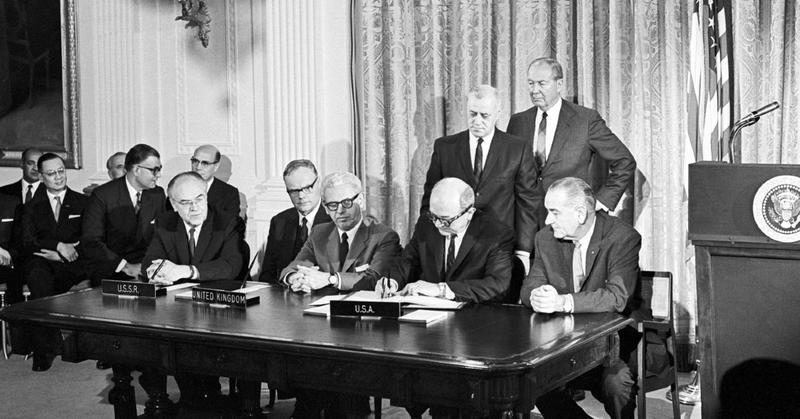The Outer Space Treaty Of 1967: The International Community's Standards For Space Exploration
By | October 8, 2020

From the moment that man started venturing into space, it became clear that we needed rules to govern the vast reaches beyond the Earth. The Outer Space Treaty of 1967 ensures that spacefaring countries mind their Ps and Qs in the unknown, mostly by prohibiting the use of weapons of mass destruction in space and anyone from owning the Moon. Since 1967, more than 100 nations have agreed to this treaty that constructed the framework of how we're supposed to act as we establish a life in the stars.
Creating Jurisdiction Without Boundaries
In space, no one can hear you draw country lines, but that's exactly what the United Nations wanted to do as soon as the Soviet Union launched Sputnik in 1957. Less than a year after Russia achieved one of the most important scientific advancements in the history of humanity, the U.N. called a general assembly named the Committee on the Peaceful Uses of Outer Space, or COPUOUS, to come up with rules for space and the possibilities of life off the planet. The committee is actually still together, boasting 77 members as of 2016, but in 1967, they could really only guess the kinds of regulations space travel might require.

The Outer Space Treaty Of 1967
While we refer to the Outer Space Treaty as the "Outer Space Treaty," its actual name is much less sci-fi but also more of a mouthful. "The Treaty on Principles Governing the Activities of States in the Exploration and Use of Outer Space, including the Moon and Other Celestial Bodies" just doesn't roll of the tongue, does it?
The main goal of COPUOUS was, and still is, to make sure that space isn't weaponized. Rather than a series of steadfast laws, COPUOUS mostly created a framework for future scientists and legal analysts to follow, but they were very specific that space and the celestial bodies therein should only to be used for peaceful purposes. To that end, Article IV of the Outer Space Treaty forbids military maneuvers or the establishment of military bases or installations of any kind. It distressingly permits the placement of weapons in orbit, but that's Future Us's problem.

Playing Nice In Space
The Outer Space Treaty isn't comprehensive by any means, but a few concepts continue to pop up in the committee's rules about the solar system. Aside from keeping various military organizations from placing nuclear weapons on the Moon, COPUOUS is also crystal clear about their stance on claiming an astral body, like an astronaut or even an entire planet, as your own. You just can't do it. If an astronaut is in need of assistance, according to the committee, you have to do whatever you can to help them, even if their country is currently at war with yours. They also advise that space stations and interstellar vehicles should be open on a reciprocal basis. Basically, the committee contends that, because space is so full of the unknown, we have to help each other, no matter what.

Sorry, You Can't Own The Moon
The regulations on ownership of celestial bodies laid out in the Outer Space Treaty go double for the Moon. Informed by the land grabs in the Arctic in the late 19th century, COPUOUS took the entirety of the Moon off the table in terms of ownership, mandating that it is "not subject to national appropriation by claim of sovereignty, by means of use or occupation, or by any other means." You can plant your flag on it, you can check it out, but you can't establish a colony or a military base. The state can launch a satellite or place a space object onto a celestial body and retain jurisdiction over that, but in that case, the state is liable for damages caused by that object, so firepits and waterbeds are not advised.

No Space Junk
With space travel in its infancy, COPUOUS wasn't sure what astronauts were going to find when they went into the inky black of space, so they added a provision that if a country brings something back from space, they must be certain that it's not going to harm the planet in any way. Referred to as "planetary protection," the rule was put in place to prevent the contamination of life on Earth by a space spore or something. Once everyone got over not being allowed to buy the Moon, this rule became one of the most important considerations of planetary missions.

You Break It, You Bought It
When an astronaut goes into space with U.S. military funding, they're watched closely to ensure adherence to strict guidelines and safety protocols, but what about non-government activity? In 1967, Space X and Virgin Galactic were still decades away, but COPUOUS predicted a time when independent contractors could blast off without government oversight, so they insisted that countries must oversee the actions of the private sector when they travel into space. To make sure they do, they're on the hook if the non-government activity goes sideways or isn't on the up and up.

International Interstellar Cooperation
When the Outer Space Treaty was created on January 27, 1967, it was signed by the United States, the United Kingdom, and the Soviet Union, and since then, more and more countries have signed up to party down cooperatively in space. By June 2020, 110 countries had signed onto the treaty, with another 23 waiting for ratification. It's clear that the human race is hardly finished with outer space exploration.

